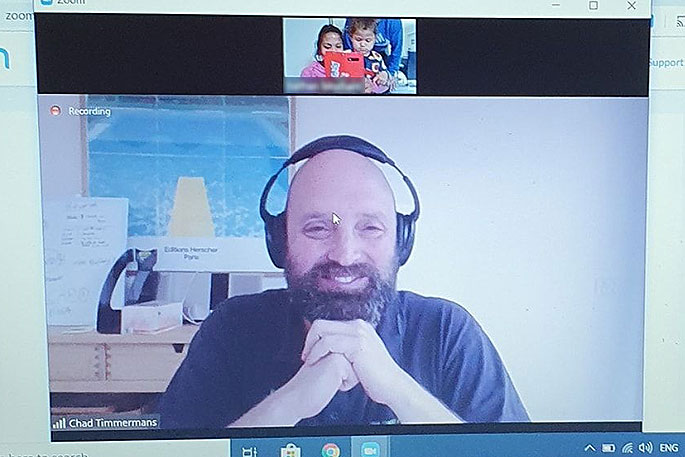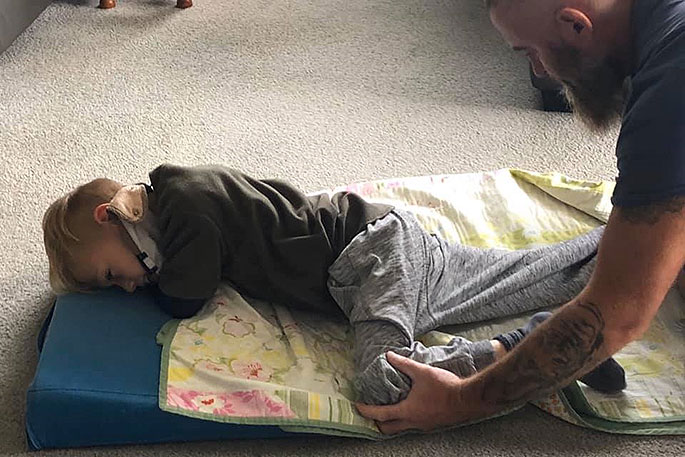No parent wants to watch their child struggle. But for those parents with children who have sustained a brain injury, struggles are an expected, and heart-breaking part of their everyday reality.
The anguish, stress and guilt that comes with seeing your child unable to reach expected milestones, unable to walk, talk, or play, is something no parent wants to go through.
But for 28 families in the Western Bay who experience this daily battle, a local charity is helping provide the practical, financial, social, and emotional support needed to create a brighter future for their children with the right interventions and therapies.
Brain Injured Children Trust help families to access services that can make a real difference in their child's development and recovery.
From home and vehicle modifications, and private carer support, to therapy programs and specialist medical treatment, the charity provides funding that would otherwise be difficult to raise as an individual so that children can make the journey from injury to independence.
One of the key services Brain Injured Children Trust helps families access is an intensive home-based therapy called Neuro-Development Therapy Program.
NDTP effectively works to rewire the brain so brain injured children can learn to do the basic milestones that neurotypical children routinely learn.
This is achieved by assisting children with repetitive movements such as standing, walking, and hanging – helping balance and train the muscles and brain how to correctly move limbs.
Brain Injured Children Trust Administrator Karen Williams says while the lockdown left many families isolated due to the vulnerability of their child's health, it also generated some positive outcomes.
'With no distractions and no rushing around, families were able to concentrate on the therapy programs which can be up to three to four hours a day – this ultimately makes the real difference for brain injured kids' progress.
 An online NDTP therapy session.
An online NDTP therapy session.
'We also established online NDTP, which has been a great success. With no Neuro Developmental therapists in New Zealand, and no overseas travel, our members were left with without therapy. We reached out to our overseas specialists and asked for help and were astounded with the response.
'Together, we have devised a programme enabling them to connect with families using video clips and online communication platforms. This system of connecting the families had not been tried before but proved to be extremely effective to support and motivate families, update their programs and monitor individual children's progress.”
With this online delivery leading to substantial cost savings, the Trust will continue to facilitate it long after the COVID-19 crisis is over.
Karen says fatigue will be the biggest obstacle for many of their members if faced with lockdown again.
'Alongside NDTP therapy, we are still supporting families to access local supports, equipment and are crisis managing families as they hit difficulties. Many of them are experiencing exhaustion and isolation – particularly for those parenting alone. But we are wrapping around them with as much practical support as we can, and will continue to do so no matter what happens going forward.”
Brain Injured Children Trust usually receives its income through a fundraising service which canvasses business for donations.
This funding has been put on hold for the last three months, with expectations that income will reduce by 20 per cent going forward.
The charity applied for funding through the COVID-19 Recovery Fund to cover wages for increased hours for their team and to help with overhead costs such as rent, phone bills, and insurance.
Karen says the $10,000 received has provided some breathing room for the Trust to operate.
'The funding has been a lifeline for the Trust as literally overnight all our funding from our major sponsor came to a halt. The first few weeks of lockdown, we were scrambling with funding applications but had decline after decline, as our services were deemed non-essential. With the Gaming Trusts closed for applications, we were hit again with no means of accessing operational costs and wages.
'We are grateful to our local funders TECT, Acorn Foundation, BayTrust and Tauranga City Council for working together to provide this funding.
"The recovery funding has given us six months of certainty to formulate a plan. It is allowing us to release some of our other limited funding to be redirected towards treatments and therapy for children that rely desperately on our assistance.”
BayTrust Chief Executive Alastair Rhodes says the funding will ensure Brain Injured Children Trust's families are supported in the coming months.
'The lockdown and the uncertainty going forward has been stressful for so many of us. But for those families with a brain injured child, juggling all of life's commitments with the dedicated care needed – it is hard to imagine the immense weight that would put on these parents.
'We are so pleased the Recovery Funding is allowing Brain Injured Children Trust to continue operating and supporting these families, especially with the online therapy – it will allow their children to continue their incredible progress towards their own recovery.”



0 comments
Leave a Comment
You must be logged in to make a comment.